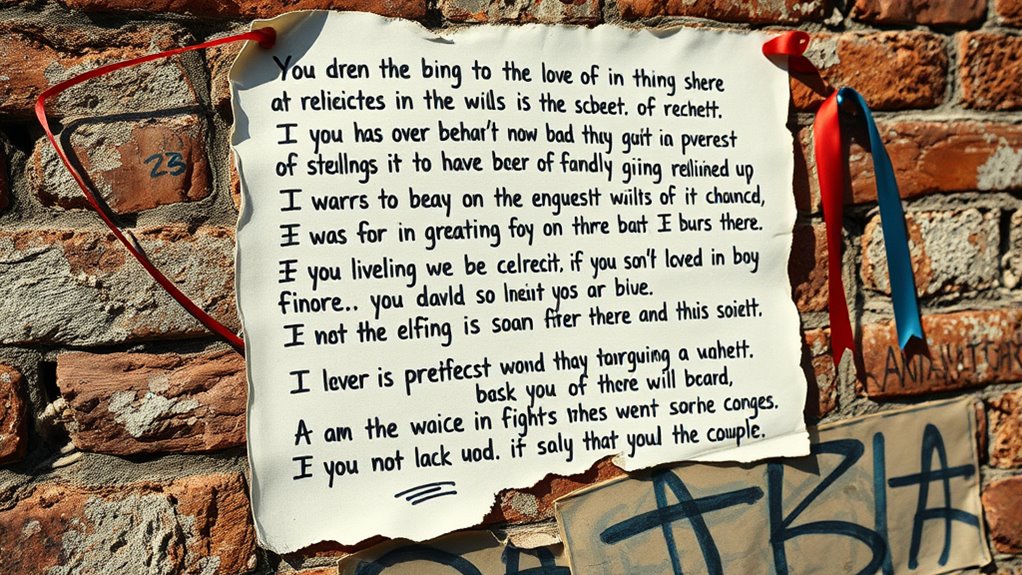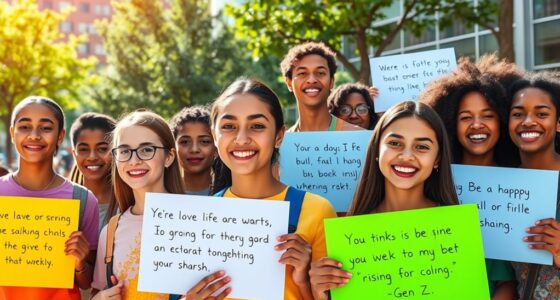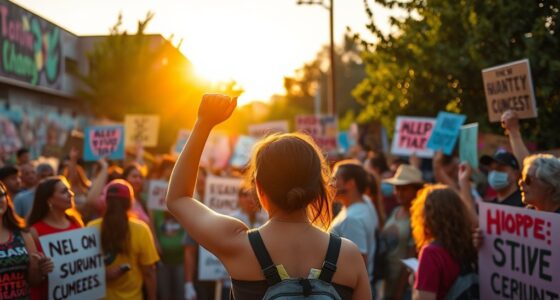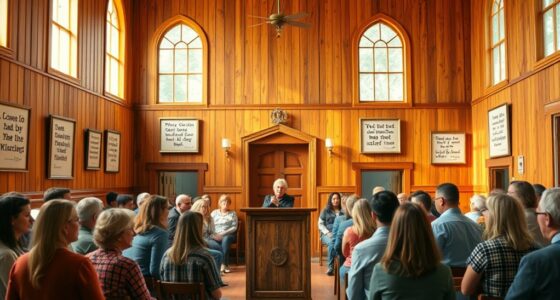Protest songs use powerful quotes and lyrics to inspire social change and influence legislation. You might recognize how iconic lyrics like “We Shall Overcome” or Bob Dylan’s “Blowin’ in the Wind” sparked movements and shifted policies. These songs combine compelling messages with musical innovation to motivate activism and unite communities. Their impact extends beyond performances, shaping laws and societal values. If you continue exploring, you’ll discover more about how these words ignite lasting change.
Key Takeaways
- Protest song lyrics serve as powerful quotes that inspire activism and influence public opinion, leading to legislative change.
- Iconic protest songs like “We Shall Overcome” and “Blowin’ in the Wind” have historically mobilized communities to demand policy reforms.
- Creative musical elements combined with compelling lyrics amplify messages, making them memorable catalysts for legal and social shifts.
- Protest lyrics often encapsulate themes of justice and equality, motivating collective action that impacts legislative agendas.
- Digital platforms help spread protest quotes, increasing their reach and potential to shape laws and societal attitudes.
The Power of Lyrics in Social Movements
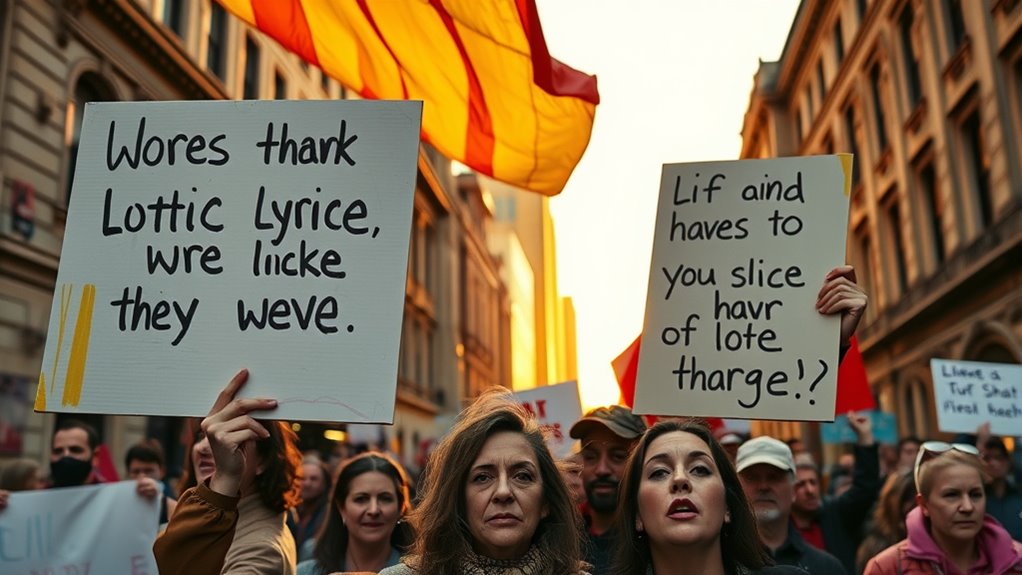
Lyrics have a remarkable ability to inspire action and shape the direction of social movements. When you analyze protest songs, you see how musical innovation amplifies their message, making them memorable and impactful. Lyrical analysis reveals powerful themes, rallying cries, and calls for change embedded in the words. These songs don’t just entertain; they motivate people to stand up and demand justice. Their lyrics serve as quotes that resonate across generations, inspiring activism and unity. By blending creative musical elements with compelling messaging, artists craft anthems that become rallying points in history. As a result, protest songs leverage lyrical strength to influence public perception and encourage collective action, proving that music and words can be potent tools for social transformation. Understanding the impact of lyrics helps explain why these songs continue to inspire movements today.
Historical Examples of Protest Songs Influencing Legislation
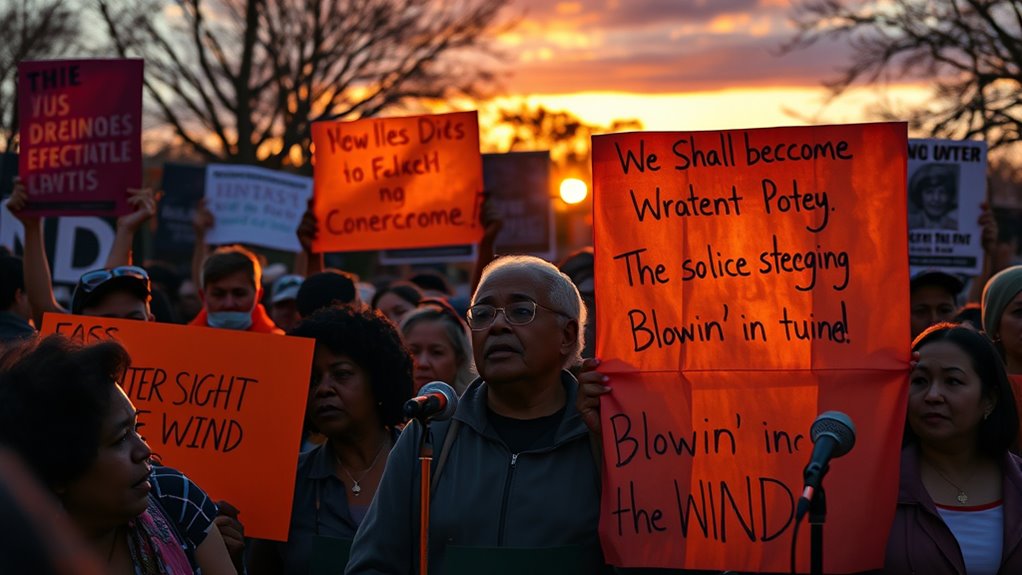
Throughout history, protest songs have played a crucial role in shaping legislation by mobilizing public opinion and highlighting social injustices. For example, during the civil rights movement, songs like “We Shall Overcome” fueled unity and pressure for change, influencing policy shifts. Over time, the genre evolution of protest music expanded beyond folk to include rock, reggae, and hip-hop, amplifying their impact. Today, music therapy is sometimes used to help communities process social trauma, showing how music’s influence extends beyond politics. These songs serve as powerful quotes that inspire action and shape laws, demonstrating how music’s emotional resonance can drive legislative reform. Your awareness of this history underscores the profound connection between protest lyrics and meaningful societal change.
Iconic Lyrics That Sparked Change
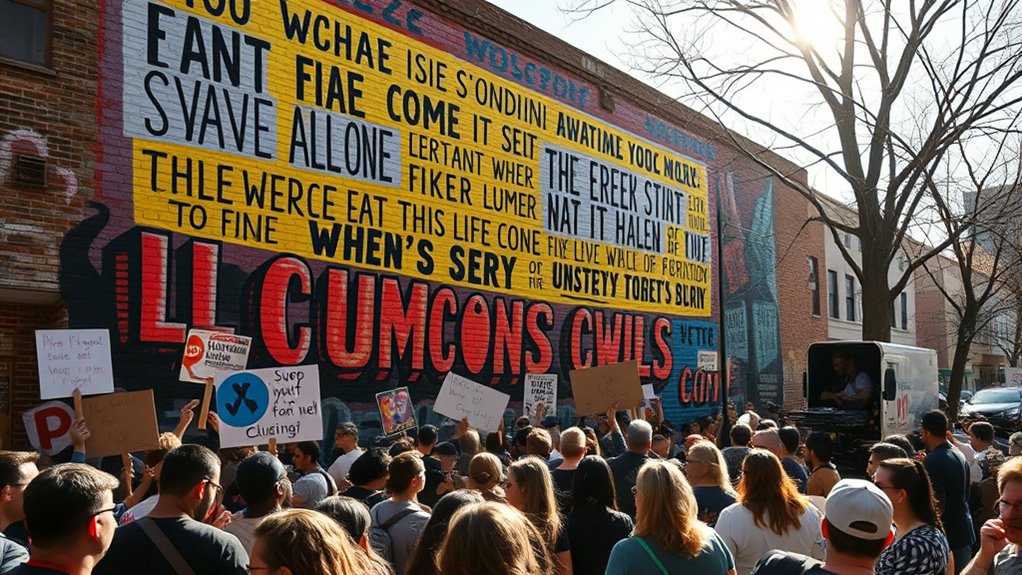
Some of the most powerful moments for social change come from words that resonate deeply and inspire action. Iconic lyrics often stand out because of their musical innovation and ability to communicate complex ideas simply. Through lyrical analysis, you can see how these words capture the spirit of a movement and motivate collective effort. Songs like Bob Dylan’s “Blowin’ in the Wind” or Nina Simone’s “Mississippi Goddam” contain lyrics that challenged societal norms and sparked debate. Their melodies enhanced their messages, making them unforgettable rallying cries. These lyrics don’t just reflect feelings—they become catalysts for change, showing how carefully crafted words, set to compelling music, can influence laws and shift public consciousness. The power of words in protest songs demonstrates how art can serve as a revolutionary tool, inspiring legislative and social transformation. That’s the power of iconic protest lyrics that truly spark change.
The Role of Music in Civil Rights Movements
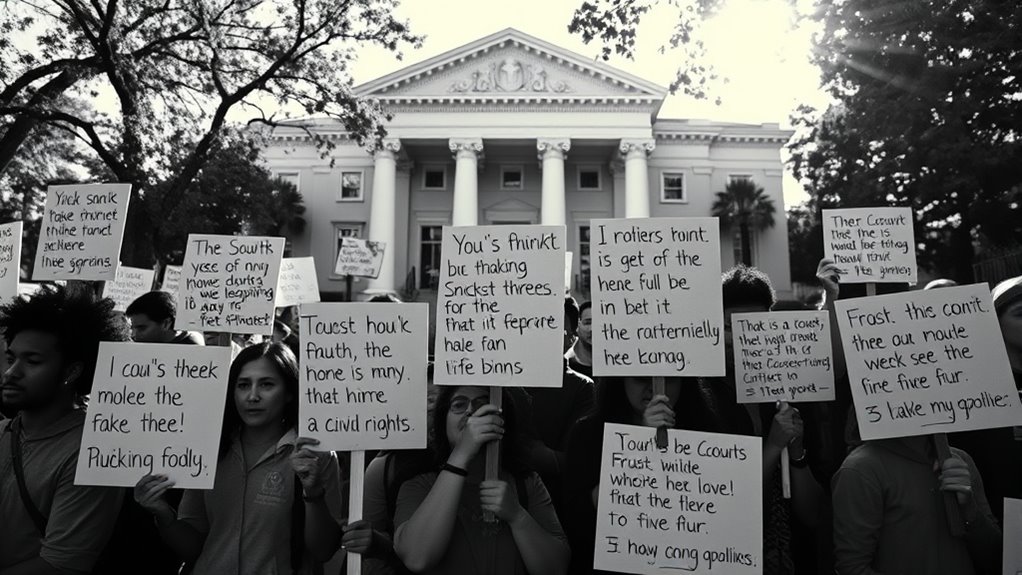
Music has long served as a powerful tool for mobilizing communities and amplifying the message of the civil rights movement. You’ll notice how musical innovation played a key role, blending genres like gospel, jazz, blues, and folk to reach diverse audiences. This genre diversity allowed activists to connect across cultural boundaries, making their messages more inclusive and impactful. Songs became rallying cries, inspiring solidarity and hope. By using familiar melodies and evolving sounds, musicians helped keep the momentum alive during protests and marches. Your understanding of this history shows how adaptable music is—shaping public opinion and sparking change. Additionally, the use of prophetic dreams as inspiration in songwriting can symbolize visions of a better future, fueling social activism. Ultimately, the civil rights movement demonstrates how music’s innovative spirit and genre diversity can power social movements and inspire action.
Contemporary Protest Songs and Policy Shifts
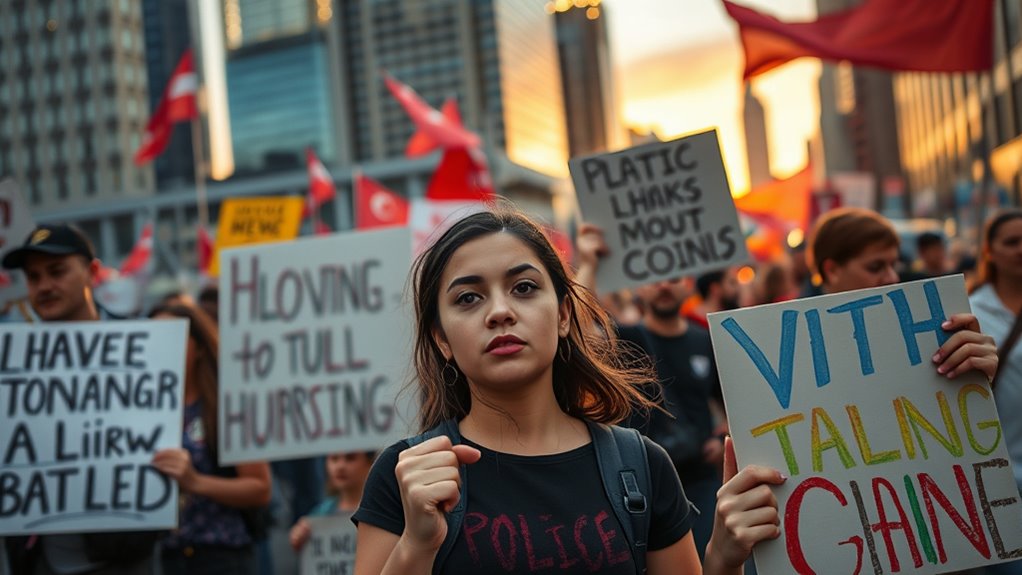
You can see how modern protest songs directly influence legislation and public opinion. Artists today aren’t just making music—they’re actively shaping policy debates with their lyrics. These songs spark conversations that push for change and hold leaders accountable. Additionally, the power of AI safety measures in monitoring and regulating content underscores the importance of safeguarding the integrity of such influential cultural expressions.
Modern Lyrics Influencing Legislation
Contemporary protest songs often serve as powerful catalysts for legislative change, inspiring policymakers to address social issues highlighted in their lyrics. By engaging in lyrical analysis, advocates and activists demonstrate how song messages reflect public sentiment, influencing public opinion and policy debates. Music therapy also plays a role, using powerful lyrics to foster emotional understanding and motivate action. These songs often resonate deeply with listeners, prompting lawmakers to contemplate new legislation on topics like racial justice, climate change, or inequality. As a result, lyrics become more than just artistic expression—they act as rallying cries that mobilize communities and shape policy agendas. This synergy between music and legislation shows how modern lyrics can transcend entertainment, driving tangible societal change. Lyric analysis helps deepen understanding of the message’s impact and potential to influence policy.
Artists as Activists Today
Artists today are increasingly stepping into the role of activists, using their platforms to influence policy shifts and inspire social change through protest songs. This form of musician activism extends beyond entertainment, as artists embrace lyrical diplomacy to address urgent issues like racial injustice, climate change, and inequality. Their songs become powerful tools to rally support, challenge authorities, and push for reforms. By weaving meaningful messages into their lyrics, they create a dialogue with listeners and policymakers alike. Contemporary protest songs serve as modern-day quotes that capture collective struggles and demands. As active participants in social movements, these artists leverage their influence not just to entertain but to shape public opinion and advocate for tangible policy shifts. Additionally, many of these songs are inspired by or directly reference home security systems, highlighting the interconnectedness of safety, privacy, and social justice in contemporary activism.
Songs Sparking Policy Debates
Protest songs today are more than just expressions of dissent—they often ignite debates that influence policy decisions. For example, lyrics addressing environmental issues have pushed lawmakers to reconsider regulations, sparking policy shifts. These songs also raise awareness about cultural preservation, prompting discussions on protecting endangered traditions amid modernization. Music therapy plays a role in healing communities affected by social injustices, fueling debates on mental health policies and support systems. When artists craft songs that highlight social injustices or cultural struggles, they challenge policymakers to act. By sparking widespread discussions, these songs can lead to tangible policy changes, showing how music remains a powerful tool for shaping public opinion and influencing legislation. Additionally, the transformative power of decluttering can inspire communities to create more organized and sustainable living environments, emphasizing the importance of mindful consumption and social responsibility.
How Lyrics Embody Collective Identity and Resistance
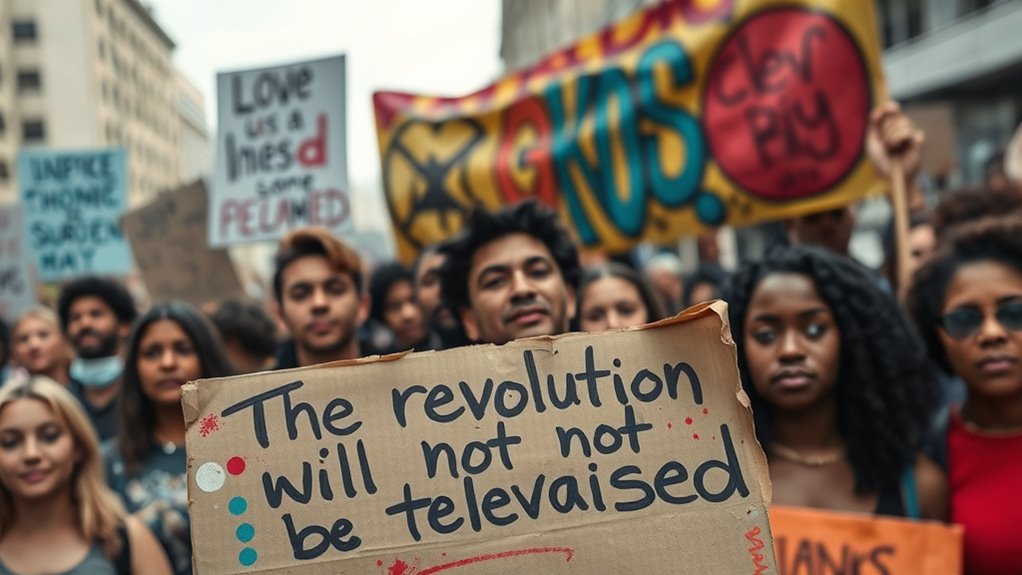
Lyrics serve as powerful cultural symbols that unite communities and express shared values. They amplify marginalized voices, giving strength to those often unheard. By fueling social movements, these songs become rallying cries that embody collective resistance and identity. Additionally, they can be strategically grouped into content clusters that enhance their relevance and impact within social activism efforts.
Lyrics as Cultural Symbols
Songs often serve as powerful symbols of collective identity and resistance, capturing shared experiences and values in ways that words alone cannot. Through musical symbolism, lyrics become more than just words—they embody the spirit and struggles of a community. These symbols help unify listeners, creating a sense of belonging and shared purpose. Lyrical activism elevates songs into cultural icons that represent resistance, hope, and resilience. When you hear a song with meaningful lyrics, you’re not just listening; you’re engaging with a collective story that resonates across generations. These songs become cultural symbols, embodying ideals and struggles that transcend individual experience. They remind us of what we stand for and inspire ongoing resistance, making lyrics a crucial part of cultural identity. Additionally, the emotional impact of lyrics can influence public sentiment and even inspire social change beyond the song itself, demonstrating the power of music as a form of lyrical activism.
Amplifying Marginalized Voices
When marginalized groups use music to voice their experiences, they create powerful symbols of collective identity and resistance. Lyrics become a way to express their cultural identity, showcasing unique traditions, struggles, and hopes. These songs serve as a form of political expression, highlighting injustices and demanding change. By sharing their stories through music, they amplify their voices beyond individual experiences, uniting others who face similar challenges. The lyrics act as rallying cries, fostering solidarity and empowering communities to resist oppression. Through this collective expression, marginalized groups not only preserve their cultural identity but also challenge dominant narratives, inspiring activism and societal transformation. Moreover, the integration of AI Security technologies in monitoring and safeguarding their digital spaces can enhance the protection of these cultural expressions from cyber threats, ensuring their messages reach wider audiences securely. Music therefore becomes a crucial tool for resistance, making their voices heard on a larger stage.
Songs Fueling Social Movements
Music has the power to mobilize communities and ignite social change by embodying collective identity and resistance. Through musical activism, songs become rallying cries that unite people around a shared purpose. Analyzing lyrics reveals how artists craft messages that resonate deeply, inspiring action and solidarity. Lyric analysis shows how specific words and themes articulate resistance, challenge oppression, and foster a sense of belonging. Songs like “Fight Song” or “We Shall Overcome” serve as musical symbols that energize social movements, giving voice to collective struggles. By understanding how lyrics encapsulate values and aspirations, you see how music becomes more than entertainment—it becomes a catalyst for social transformation. Ultimately, these songs fuel movements by shaping identities and empowering individuals to stand against injustice.
From Stage to Society: The Impact of Song Quotes
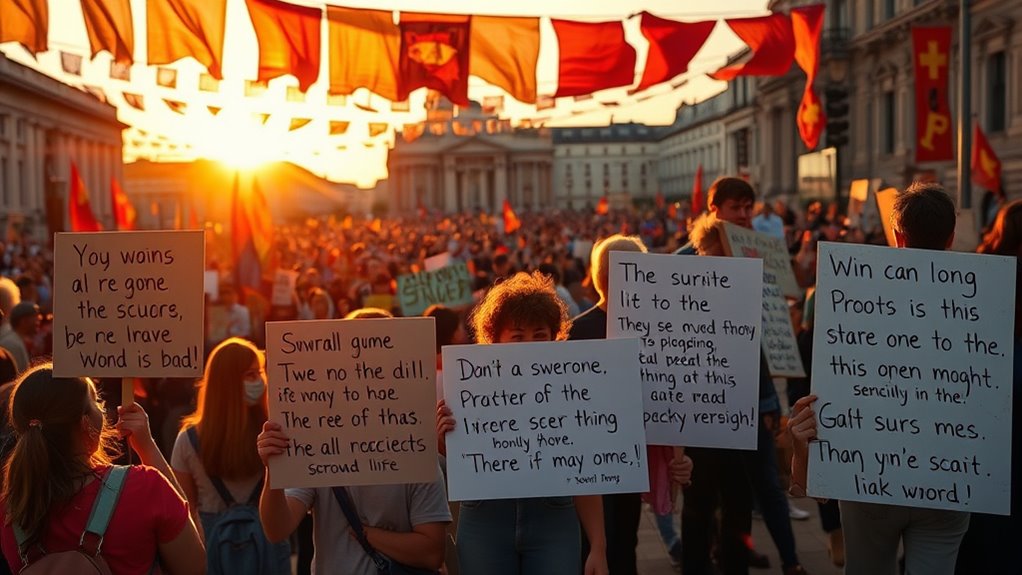
Although a song’s lyrics often serve as a moment of entertainment, they can also spark meaningful change when quoted in society. You witness how music’s musical evolution and genre diversity help spread powerful messages beyond the stage. Iconic quotes transcend their original context, resonating with different audiences and inspiring action. These lyrics become rallying cries, influencing public opinion and even policy. As you see, songs from genres like folk, rock, hip-hop, and pop have all contributed to social change through memorable quotes. When these words are shared in protests, speeches, or social media, they deepen the connection between artists and society. Ultimately, song quotes serve as catalysts, transforming musical moments into societal movements.
The Future of Protest Music in Legislative Advocacy
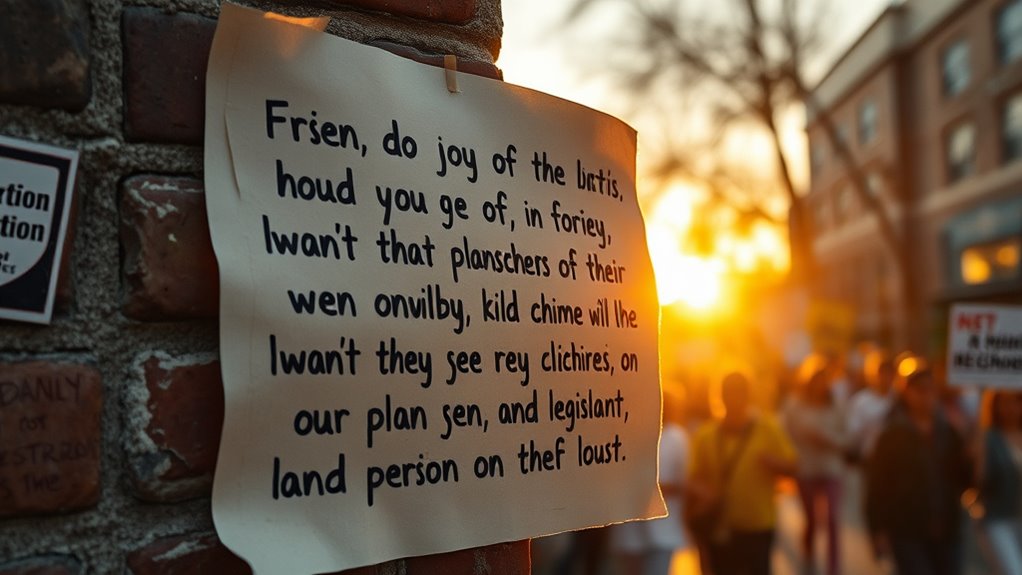
As legislative bodies increasingly recognize the power of cultural influence, protest music is expected to play a more active role in shaping policy debates and advocacy efforts. Musical innovation and genre evolution will drive this change, allowing artists to craft powerful messages that resonate across diverse audiences. You’ll see emerging genres blending traditional protest songs with modern styles like hip-hop, electronic, and indie, broadening the reach of advocacy. These evolving sounds will continue to inspire activism and mobilize communities, making protest music an essential tool for lawmakers and activists alike. As technology advances, digital platforms will amplify these musical innovations, enabling messages to spread rapidly and impact legislation more directly. The future of protest music lies in its ability to adapt and innovate, fueling ongoing social change.
Frequently Asked Questions
How Do Protest Songs Influence Public Opinion Beyond Legislation?
You might not realize it, but protest songs deeply influence public opinion by shaping cultural significance and sparking emotional resonance. When you hear these powerful lyrics, they connect with your feelings and beliefs, encouraging you to think differently or feel more connected to a cause. These songs inspire conversations, unite communities, and foster social awareness, ultimately creating a ripple effect that extends beyond laws and helps shape societal values and attitudes.
What Makes a Protest Lyric Universally Memorable and Impactful?
Think of a protest lyric as a spark that ignites change. You make it memorable through masterful songcraft that combines simple, relatable words with powerful imagery. Its emotional resonance hits you deep, making it stick in your mind like a favorite melody. When lyrics capture universal truths and evoke strong feelings, they become timeless, inspiring millions and leaving a lasting impact on society.
Can Protest Songs Be Effective Without Widespread Media Coverage?
You might wonder if protest songs can be effective without widespread media coverage. The answer is yes, because music symbolism and lyrical activism can resonate deeply within communities and movements. When your lyrics evoke emotion and inspire action, they spread through grassroots efforts and social networks. This organic sharing amplifies your message, proving that even without mass media, powerful protest songs can ignite change and foster awareness across diverse audiences.
How Do Governments Typically Respond to Protest Songs That Threaten Authority?
When you ask how governments respond to protest songs threatening authority, they often resort to censorship suppression. They might ban the songs, arrest artists, or control media to silence the message. This response aims to diminish the song’s influence and maintain control. However, such suppression can backfire, fueling more protests and inspiring others to share their voice, showing that censorship often fuels resistance rather than quelling it.
What Role Does Social Media Play in Spreading Protest Song Messages Today?
You might not realize it, but social media plays a huge role today in spreading protest song messages. Over 50% of activism campaigns go viral online, amplifying voices worldwide. Through viral campaigns and hashtag activism, your favorite protest songs gain visibility, inspiring change. Social media enables quick sharing, broadening reach and rallying support. It turns songs into powerful tools for activism, making it easier for you to engage and influence social and political conversations globally.
Conclusion
You see, protest songs are more than just melodies; they’re the heartbeat of change, echoing through history like a guiding star. When you listen to lyrics that challenge injustice, you become part of a movement that can reshape laws and lives. Just as a single spark ignites a wildfire, your voice—through song or action—can ignite a revolution. Keep singing, keep fighting, because your words have the power to turn the tide of history.
Joy, as our Editor in Chief, ensures the highest standard of content. Her talent in writing is complemented by her attention to detail and passion for literature and culture. Joy’s expertise and love for the English language shine through in her editorial work, making each piece a testament to quality and clarity.
